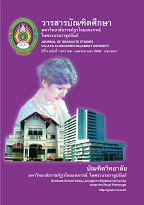รูปแบบของระบบพี่เลี้ยงและให้คำปรึกษาเพื่อพัฒนาความสามารถในการสอนและการทำวิจัยปฏิบัติการในชั้นเรียนของครูวิทยาศาสตร์
Main Article Content
Abstract
บทคัดย่อ
การวิจัยนี้มีวัตถุประสงค์เพื่อศึกษารูปแบบการสร้างระบบพี่เลี้ยงและให้คำปรึกษาเพื่อพัฒนาความสามารถในการสอนและการทำวิจัยปฏิบัติการในชั้นเรียนของครูวิทยาศาสตร์และผลลัพธ์ที่เกิดขึ้น ผู้วิจัยใช้วิธีการสังเคราะห์งานวิจัยเชิงคุณภาพ ด้วยวิธีการวิเคราะห์เนื้อหาจากรายงานการวิจัยเกี่ยวกับการประเมินโครงการการพัฒนาครูโดยใช้กระบวนการสร้างระบบพี่เลี้ยงและให้คำปรึกษาของสำนักงานเขตพื้นที่การศึกษาประถมศึกษาจำนวน 9 แห่ง ที่ทำความร่วมมือกับคณะศึกษาศาสตร์ มหาวิทยาลัยเกษตรศาสตร์ ข้อมูลที่ได้จากการสังเคราะห์จะถูกรวบรวมและจัดเป็นหมวดหมู่ พร้อมอธิบายขยายความเชิงพรรณนา ผลการวิจัยพบว่า 1) ระบบพี่เลี้ยงและให้คำปรึกษาแบ่งกิจกรรมในการดำเนินโครงการเป็น 2 รูปแบบ คือ กิจกรรมการฝึกอบรมและกิจกรรมการสร้างระบบพี่เลี้ยงและให้คำปรึกษา โดยกิจกรรมการฝึกอบรมจะมีทั้งหมด 2 ครั้ง ครั้งที่ 1 เป็นการให้ความรู้เกี่ยวกับแนวทางการจัดกิจกรรมการสอนวิทยาศาสตร์ ครั้งที่ 2 เป็นการให้ความรู้เกี่ยวกับการทำวิจัยปฏิบัติการในชั้นเรียน ส่วนกิจกรรมการสร้างระบบพี่เลี้ยงและให้คำปรึกษา มีการดำเนินงานเดือนละ 1 ครั้ง รวมทั้งหมด 3 ครั้ง โดยกำหนดให้มีการให้คำปรึกษา ณ สถานศึกษาในเขตพื้นที่การศึกษาแต่ละเขต กิจกรรมการสร้างระบบพี่เลี้ยงและให้คำปรึกษาดำเนินการโดยวิทยากรจำนวน 8 ท่าน ซึ่งสามารถจำแนกรูปแบบของการสร้างระบบพี่เลี้ยงและให้คำปรึกษาได้เป็น 5 รูปแบบ แต่ละรูปแบบจะมีกระบวนการหลักๆ ที่คล้ายกัน แต่แตกต่างกันที่รายละเอียดปลีกย่อยเกี่ยวกับแนวทางการให้ความรู้แก่ครูของวิทยากรและการมอบหมายงานให้ครูปฏิบัติในระหว่างฝึกอบรม โดยส่วนใหญ่แล้วระบบพี่เลี้ยงและให้คำปรึกษา จะเริ่มจากการให้ครูดู วีดิทัศน์การสอนเพื่อฝึกสะท้อนความคิดเกี่ยวกับการสอน จากนั้นวิทยากรบรรยายเกี่ยวกับเป้าหมายและแนวทางการสอนวิทยาศาสตร์ที่ควรจะเป็น แล้วจึงให้ครูวิเคราะห์การสอนของตนเองและระบุว่าต้องการพัฒนาการสอนของตนเองอย่างไร นำไปสู่การเขียนคำถามวิจัยเพื่อดำเนินการทำวิจัยปฏิบัติการในชั้นเรียนของครูแต่ละคน จากนั้นให้ครูแต่ละคนเขียนแผนการจัดการเรียนรู้และนำไปใช้สอนจริงพร้อมกับถ่ายวีดิทัศน์และบันทึกหลังสอนเพื่อนำข้อมูลมาอภิปรายร่วมกันเกี่ยวกับจุดเด่น จุดด้อยของการสอนและหาแนวทางปรับปรุงแก้ไข วิทยากรให้คำแนะนำเกี่ยวกับวิธีการเก็บรวบรวมข้อมูล การวิเคราะห์ข้อมูล การนำเสนอข้อมูล และการเขียนรายงานผลการวิจัย เสร็จแล้วจึงมอบหมายให้ครูทุกคนเขียนรายงานการวิจัยฉบับสมบูรณ์ส่ง 2) ผลลัพธ์ที่เกิดขึ้นจากการกระบวนการสร้างระบบพี่เลี้ยง คือ ครูมีความมั่นใจมากขึ้นเกี่ยวกับการพัฒนาการสอน และการทำวิจัยปฏิบัติการในชั้นเรียน แต่ยังพบปัญหาเกี่ยวกับภาระงานที่คาดหวังจากครูที่เข้าร่วมโครงการมีมากเกินไป การดำเนินการโครงการที่จัดในวันหยุดเสาร์หรืออาทิตย์ทำให้ครูต้องทำงานหนักทั้ง 7 วันต่อสัปดาห์ เกิดความอ่อนล้า นอกจากนี้ครูบางคนมีแนวคิดเกี่ยวกับการวิจัยแบบดั้งเดิม ไม่ยอมรับรูปแบบงานวิจัยใหม่ๆ และครูไม่ยอมปรับแก้งานตามคำแนะนำของวิทยากร
ABSTRACT
This research aimed to study the coaching and mentoring system models and their results in developing science teachers’ teaching practices and the ability to conduct the Classroom Action Research. The content analysis was employed to synthesize qualitative data from nine research project reports in Primary Educational Service Areas, which collaborated with the Faculty of Education, Kasetsart University. Themes were generated accompany with descriptive explanation. Results indicated that: 1) there were two activities for the coaching and mentoring system, the ‘Training activity’ and the ‘Coaching and Mentoring activity’. The Training activity was done over two days to provide knowledge about ways to organize science learning activities (day 1) and how to conduct the Classroom Action Research project (day 2). The Coaching and Mentoring activity was done once a month for three months in the school in each Primary Educational Service Area. The Coaching and Mentoring system was delivered by eight lecturers which could classify into five models of Coaching and Mentoring system. Each model had similar main processes, but differences in some little details about ways to provide knowledge and assign work to the teachers. Most of the Coaching and Mentoring system models started by practicing teachers to reflect the teaching practice from the video clip. Then the lecturers described about goals and expected ways to teach science to the teachers. Next, the teachers were asked to analyse their teaching practices and identify the aspect that they would like to improve which lead to the research question for each Classroom Action Research project. After that, each teacher was assigned to write the lesson plans, to implement the lesson plans, to record the video of their teaching, and to write the journals after teaching for getting the data to discuss together about strengths, weaknesses, and ways to improve teaching practices. The lecturers provided feedback to the teachers about data collection and data analysis methods, data presentations, and how to write the research report. Finally, the completed Classroom Action Research reports were sent to the lecturers. 2) the results of coaching and mentoring system showed that most of teachers were more confident about developing their teaching practices and conducting the Classroom Action Research project. In contrast, there were some problems about too much expected workloads from the attending teachers. The operations of the project in weekends lead to exhaustion of the teachers for working seven days a week. Some teachers hold a traditional concept of research designs and did not accept the new research designs. Furthermore, some teachers refused to correct their work according to the lecturers’ guidance.
Article Details

This work is licensed under a Creative Commons Attribution-NonCommercial-NoDerivatives 4.0 International License.
บทความทุกเรื่องได้รับการตรวจความถูกต้องทางวิชาการโดยผู้ทรงคุณวุฒิ ทรรศนะและข้อคิดเห็นในบทความ Journal of Global of Perspectives in Humanities and Social Sciences (J-GPHSS) มิใช่เป็นทรรศนะและความคิดของผู้จัดทำจึงมิใช่ความรับผิดชอบของบัณฑิตวิทยาลัย มหาวิทยาลัยราชภัฏวไลยอลงกรณ์ ในพระบรมราชูปถัมภ์ กองบรรณาธิการไม่สงวนสิทธิ์การคัดลอก แต่ให้อ้างอิงแหล่งที่มา


